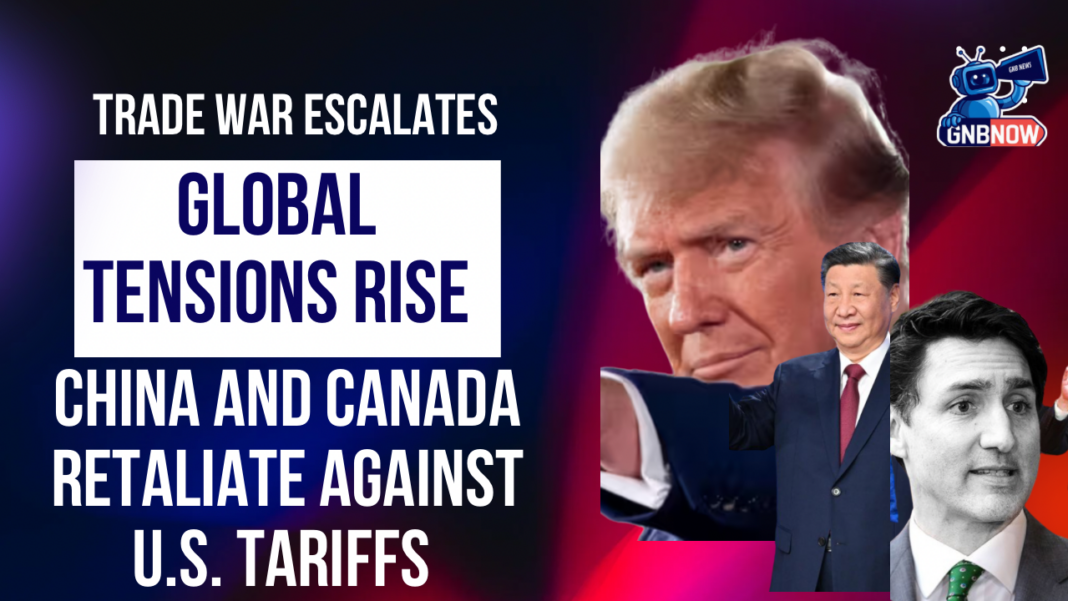In a significant escalation of global trade tensions, China and Canada have announced retaliatory measures against newly imposed U.S. tariffs. The U.S. tariffs, which took effect at midnight on Tuesday, impose a 25% levy on nearly all goods imported from Canada and Mexico, alongside an increased 20% tariff on Chinese products.
According to the Chinese Foreign Ministry, China has introduced tariffs of up to 15% on key U.S. goods, including chicken, wheat, corn, and cotton, as well as a 10% tariff on sorghum, soybeans, pork, beef, fruits, vegetables, and dairy products. The ministry stated that these U.S. measures undermine cooperation between the world’s two largest economies and harm American businesses and consumers.
Similarly, Canada has vowed to impose tariffs of up to 25% on a wide range of U.S. products, including fresh produce, automobiles, and electronics. Prime Minister Justin Trudeau emphasized that Canada would not let the U.S. decision go unanswered.
The U.S. tariffs, justified by President Donald Trump as necessary to combat fentanyl trafficking and the influx of illegal drugs, have sparked concerns about their potential economic repercussions. The White House fact sheet highlights that the tariffs are implemented under the International Emergency Economic Powers Act (IEEPA) to address the extraordinary threat to U.S. national security posed by unchecked drug trafficking. Economists warn that the tariffs could lead to higher consumer prices, disrupt supply chains, and exacerbate inflationary pressures. These measures come at a time when the U.S. economy is already facing inflationary challenges and showing signs of strain, according to The Wall Street Journal.
Historical Context
The current trade war traces its roots back to 2018, when the U.S. first imposed tariffs on Chinese goods, citing unfair trade practices and intellectual property theft. Over the years, the conflict has expanded to include other trading partners, such as Canada and Mexico, with tariffs becoming a recurring tool in geopolitical negotiations. Despite brief periods of de-escalation, tensions have persisted, reflecting deeper structural issues in global trade dynamics.
Economic Impacts of the Tariffs
The newly imposed tariffs and retaliatory measures are expected to have several significant economic consequences, as highlighted by Bloomberg and Reuters:
- Higher Consumer Prices: Consumers are likely to face increased costs for electronics, clothing, household items, and groceries as businesses pass on the additional tariff expenses.
- Rising Inflation: The spike in consumer prices could further fuel inflation, putting additional pressure on household budgets.
- Supply Chain Disruptions: Key industries, such as automotive and construction, may experience significant disruptions in their supply chains.
- Agricultural Sector Strain: U.S. farmers could suffer as tariffs on soybeans, pork, beef, fruits, and vegetables reduce demand for American agricultural exports and lower prices, according to The New York Times.
- Slowed Economic Growth: Increased costs for businesses and consumers may lead to reduced spending, potentially slowing economic growth.
- Job Losses: Higher costs and disrupted supply chains could result in layoffs, particularly in the manufacturing sector.
- Strained Global Trade Relations: The escalating trade war could further damage relations between the U.S. and its trading partners, potentially triggering additional retaliatory measures and prolonged economic disruptions.
Expert Opinions
Economists and trade experts have weighed in on the potential long-term consequences of the trade war.
Dr. Mary Thompson, a senior trade policy expert at Harvard University, warns, “The cyclical nature of tariffs and retaliatory measures creates a lose-lose situation for all parties involved. The global economy thrives on cooperation, and these actions only deepen uncertainty.”
Similarly, David Lin, a senior economist at the World Bank, notes, “The agricultural sector, in particular, is vulnerable to these tariffs. Farmers in the U.S. and abroad face reduced demand and lower prices, which could lead to long-term economic hardship.”
Global Reactions
The European Union and other major trading partners have expressed concern over the escalating trade war. European Commission President Ursula von der Leyen stated, “The EU remains committed to free and fair trade. We urge all parties to resolve their differences through dialogue rather than punitive measures.”
Meanwhile, emerging economies, such as India and Brazil, are closely monitoring the situation. Analysts suggest that these nations could benefit from increased trade opportunities as the U.S., China, and Canada redirect their focus.
What’s Next?
The situation remains fluid, with the possibility of additional tariffs on steel, aluminum, and agricultural products looming on the horizon, according to CNBC. Experts suggest that diplomatic negotiations will be crucial in preventing further escalation. However, with both sides firmly entrenched in their positions, a swift resolution appears unlikely.
Engage with Us
What are your thoughts on the escalating trade war? How do you think it will impact the global economy? Share your opinions in the comments below or join the conversation on social media using the hashtag #TradeWar2025 #GnbNow
A global media for the latest news, entertainment, music fashion, and more.




